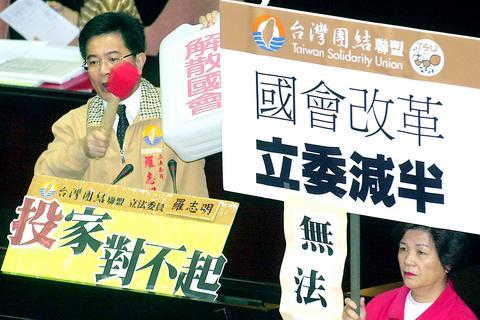Upset with what it sees as a watered-down Referendum Law (公民投票法), the Democratic Progressive Party (DPP) plans to request a constitutional interpretation of the law and to launch a referendum drive to have it vetoed.
The Cabinet was also considering rejecting the referendum law.

PHOTO: CHIEN JUNG-FENG, TAIPEI TIMES
The DPP legislative caucus lodged protests with Legislative Speaker Wang Jin-pyng (王金平) late Thursday night after the law was passed, accusing Chinese Nationalist Party (KMT) and People First Party (PFP) lawmakers of secretly replacing certain clauses of the bill during its third reading.
The DPP said the new law infringes on the Constitution, arguing that the Referendum Supervisory Committee, which would oversee the topics allowed for referendums, deprives people of the right to initiative referendums.
The DPP legislative caucus called the legislation process illegal and said it will file a constitutional interpretation of the legislation.
DPP caucus whip Ker Chien-ming (
DPP Legislator Chen Chun-hsin (陳忠信) said yesterday that provision 28 of the law was redundant as it stipulates that people can only ratify a constitutional amendment once 75 percent of legislators approved the bill and the bill was subsequently approved by a meeting of the National Assembly.
"Provision No. 2 of the law enables the people to vote in a referendum on a constitutional amendment, but provision No. 28 makes an additional requirement that the legislative body and an extraordinary National Assembly also approve it. It's redundant," Chen said.
"The pan-blue alliance admitted privately the awkwardness of the provisions, but was unwilling to make corrections to them," Chen said.
Responding to the DPP's accusation of a biased ruling on Thursday's reading of the law, Wang admitted yesterday there were flaws, but said the mistakes were corrected immediately.
In response to the Cabinet's proposal to override the Referendum Law, KMT caucus whip Lee Chia-chin (李嘉進) said yesterday that, given the dominance of pan-blue lawmakers, it would be easy for them to veto the Cabinet's proposal to reject the bill. The Cabinet's plan would be vetoed if half of the lawmakers disapprove of it.
In addition to requesting a constitutional interpretation, DPP headquarters yesterday proposed initiating a referendum drive to veto the law.
DPP Deputy Secretary-General Lee Ying-yuan (
Lee said if the Referendum Supervisory Committee approves such a referendum proposal, the referendum to toss out the referendum law could be held before the next presidential election, scheduled for March 20.
However, Lee said, if the referendum overseeing body set up to screen the topics allowed for a referendum rejects the proposal, the referendum could instead coincide with the Legislative Election at the end of next year.
"The opposition alliance passed a ridiculous referendum law. The DPP will not rule out all means possible to reject such a consequence," Lee said.
Also See Stories:
Referendum Law not a triumph for pan-blues: Ma
Yu lashes out at legislature over referendum law
China is `seriously concerned' about referendum law

ENDEAVOR MANTA: The ship is programmed to automatically return to its designated home port and would self-destruct if seized by another party The Endeavor Manta, Taiwan’s first military-specification uncrewed surface vehicle (USV) tailor-made to operate in the Taiwan Strait in a bid to bolster the nation’s asymmetric combat capabilities made its first appearance at Kaohsiung’s Singda Harbor yesterday. Taking inspiration from Ukraine’s navy, which is using USVs to force Russia’s Black Sea fleet to take shelter within its own ports, CSBC Taiwan (台灣國際造船) established a research and development unit on USVs last year, CSBC chairman Huang Cheng-hung (黃正弘) said. With the exception of the satellite guidance system and the outboard motors — which were purchased from foreign companies that were not affiliated with Chinese-funded

PERMIT REVOKED: The influencer at a news conference said the National Immigration Agency was infringing on human rights and persecuting Chinese spouses Chinese influencer “Yaya in Taiwan” (亞亞在台灣) yesterday evening voluntarily left Taiwan, despite saying yesterday morning that she had “no intention” of leaving after her residence permit was revoked over her comments on Taiwan being “unified” with China by military force. The Ministry of the Interior yesterday had said that it could forcibly deport the influencer at midnight, but was considering taking a more flexible approach and beginning procedures this morning. The influencer, whose given name is Liu Zhenya (劉振亞), departed on a 8:45pm flight from Taipei International Airport (Songshan airport) to Fuzhou, China. Liu held a news conference at the airport at 7pm,

AIR SUPPORT: The Ministry of National Defense thanked the US for the delivery, adding that it was an indicator of the White House’s commitment to the Taiwan Relations Act Deputy Minister of National Defense Po Horng-huei (柏鴻輝) and Representative to the US Alexander Yui on Friday attended a delivery ceremony for the first of Taiwan’s long-awaited 66 F-16C/D Block 70 jets at a Lockheed Martin Corp factory in Greenville, South Carolina. “We are so proud to be the global home of the F-16 and to support Taiwan’s air defense capabilities,” US Representative William Timmons wrote on X, alongside a photograph of Taiwanese and US officials at the event. The F-16C/D Block 70 jets Taiwan ordered have the same capabilities as aircraft that had been upgraded to F-16Vs. The batch of Lockheed Martin

GRIDLOCK: The National Fire Agency’s Special Search and Rescue team is on standby to travel to the countries to help out with the rescue effort A powerful earthquake rocked Myanmar and neighboring Thailand yesterday, killing at least three people in Bangkok and burying dozens when a high-rise building under construction collapsed. Footage shared on social media from Myanmar’s second-largest city showed widespread destruction, raising fears that many were trapped under the rubble or killed. The magnitude 7.7 earthquake, with an epicenter near Mandalay in Myanmar, struck at midday and was followed by a strong magnitude 6.4 aftershock. The extent of death, injury and destruction — especially in Myanmar, which is embroiled in a civil war and where information is tightly controlled at the best of times —